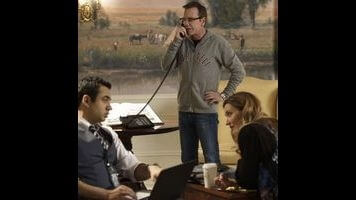Designated Survivor plays it down the middle while upping the stakes

I’ve misjudged Congresswoman Hookstraten, and rather embarrassingly at that. Given her combative behavior with Kirkman since the bombing, I labeled her as one of the show’s long-term villains—someone who would needlessly block good guys to push her own ambition. But while I’m betting some ambition still plays a factor in her character, it’s clear now that no matter how frustrating she gets, she’s not in league with the real villains. Her line to MacLeish before MacLeish’s confirmation hearing clinches this: “I don’t trust anyone who has things handed to them in life. Especially power.” It’s about as straightforward and direct as opposition gets, and her reasoning is defensible; we know that Kirkman is a good guy because we’ve been watching him all along, but she doesn’t know that.
It’s embarrassing that I misjudged this, because Hookstraten is a crucial archetype necessary to the show’s idealism and concept of good government. There are evil men and women, of course, but Designated Survivor believes in the ideal of balance. While maybe not the most realistic approach, that does make for better storytelling because it allows for antagonists who can never be easily dismissed. And the show has been aggressive about trying to allow even the most seemingly venal public figures—the governor jailing Muslims without cause, for instance—a certain degree of, if not dignity, than at least commitment to principle. While these characters remain largely undeveloped, the sense that they actually believe that what they’re doing really is what’s best for the American people allows the writers to act as though they aren’t choosing sides.
Which, sure, that’s smart drama. The problem is that this is also a show that deals with real-world problems—vastly over-simplified versions of those problems to be sure, but still recognizably things that could (and often do) happen in the real world. This week’s Crisis has Kirkman dealing with a whistleblower whose leaks of NSA documents puts the nation at theoretical risk. Gabriel Thompson’s motives are pure enough, and as a device, it helps lead us to the next stage of the over-arcing plot, as he ultimately hands over information that shows Kirkman that there’s a traitor in the government.
But in the meantime, there’s the small matter of Thompson leaking a memo Emily once wrote about how a certain senator was a sleazy bastard—a senator who, after a brief retirement, has now returned to serve as chairman of the most powerful committee in Congress. Sen. Hazelton demands that Kirkman fire Emily; she apologizes, but he won’t accept the apology; and all seems for naught until Thompson (after meeting with Aaron) gives up the other piece of the puzzle: proof that Emily’s claims were true.
Viewed as a simple plot schematic, this works fine, but the details are troubling, and betray one of the central flaws in the show’s obsession with a certain conception of “even-handedness.” Because we never see Kirkman ask Emily if the allegations were true. Sure, the President refuses to fire her, but he’s also standing in the room when she apologizes for saying the absolute truth in a private document that Hazelton should never have read. There’s a creepy vibe of Emily somehow being in the wrong without ever getting into the details of the case, and it runs the risk of putting Kirkman at the mercy of circumstance.
That’s only one plot line in the hour, though, and the others were considerably more fun. Things are getting tight for Hannah, tight enough that she pulls Chuck along to help her solve the riddle of “11:14 PM;” after asking some questions of MacLeish’s former command (all of whom call him a “hero” in the same Manchurian Candidate kind of way; the decision to cut between their answers and MacLeish’s testimony about the mission that supposedly made him a hero was simply but effective) leads Hannah to the photographic evidence that MacLeish and Catalan knew one another before the bombing. She also gets proof from her CIA friend that MacLeish’s supposed “heroism” is just a cover for the slaughter of innocents.
Then she gets hit by a van while driving to give testimony in front of Congress, which is the sort of cheap plotblocking that could be a fun way to make things more exciting, or could just be a stall. The fact that Kirkman ends the hour learning that a government conducted assessment of Congress’s vulnerability to attack was leaked to whoever ran the bombing (Kirkman still thinks it’s Nassar, but he’s basically a patsy, yes?) at least offers the possibility that Hannah and Chuck might not be quite as alone in their hunt for the truth anymore. Seven episodes in, and we still don’t have a clear sense of who the real villains are. I’m hoping the build-up means something extra special, and not just generic middle European types, but we’ll have to wait and see.
Stray observations
- A whole bunch of independents got elected to Congress on Kirkman’s coattails, again playing into a fantasy that could honestly play to either side of the political divide.
- An internal affairs guy shows up to question Jason about his confession. Right now, at least, he’s a standard issue asshole bureaucrat.
- The fact that the episode tries to use “Mr. President, do you have anything to hide?” as a pre-commercial cliffhanger is hilarious. Of course he doesn’t have anything to hide. That’s the whole damn point of his character.
- Chuck is a stand up dude. Just wanted to get out the good word on that.
- Emily and Aaron are going to hook up, in case anyone was worried that two attractive people weren’t going to kiss.